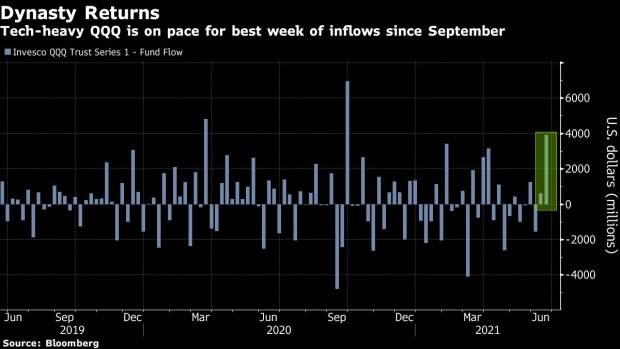Jun 18, 2021
Fed Shocks Stocks With Blow to Dreams of Value Investor Nirvana
, Bloomberg News

(Bloomberg) -- All it took was a few dots from the Federal Reserve to put the nascent value-stock revival in doubt.
Cyclical companies tied to reopening and reflation bore the brunt of the reversal, posting some of the worst returns of the year this week, while the Nasdaq 100 emerged -- as it did in 2020 -- as a beneficiary. Volatility broke out in equities following Wednesday’s Fed decision, where policy makers projected raising interest rates twice by the end of 2023. The tech rally was accompanied by a violent flattening of the 5-year to 30-year Treasury yield curve, which narrowed by the most since 2011 on a weekly basis.
Fueling the action is the idea that the Fed -- contrary to the narrative of the last few months -- won’t actually allow the U.S. economy to run too hot for too long. That drove long-term inflation expectations lower, delivering a harsh blow to cyclical sectors, with financials and energy bringing up the rear. It also sent value-investing diehards back into retreat, just six months into what was thought to be their long-awaited renaissance.
“You’re getting a bit of a gut check for the value trade. You have these sectors that have really outperformed, it was an area of the market that got crowded and you saw that tech became under-loved,” said Keith Lerner, the chief market strategist at Truist Advisory Services. “That means you get more vulnerable to unexpected news -- even though it was a marginal shift from the Fed -- I think that was a catalyst to exacerbate the rotation.”
The Nasdaq 100 rose 0.4% en route to its longest weekly winning streak since last August. Every other major stock benchmark fell, with the Dow Jones Industrial Average -- populated primarily by value names -- dropped 3.5% in its worst weekly showing since January.
That shifting appetite is evident in exchange-traded fund flows as well. The $170 billion Invesco QQQ Trust Series 1 ETF (ticker QQQ) absorbed $3.9 billion through Thursday, on pace for its best week of inflows since September. Meanwhile, the $82 billion Vanguard Value ETF (ticker VTV) suffered its biggest one-day outflow since January in the wake of the Fed meeting.
The reversal to mega-cap tech companies narrowed the number of potential market winners. That was illustrated this week by the outperformance of capitalization-weighted versus equal-weighted indexes, which was the biggest since September. Such concentrations were the rule in 2020 and threaten to end a brief revival in the fortunes of active stock managers, who feast when rally participation is broad.
In the first half of 2020, fears of rapidly rising inflation knocked tech stocks from their top spot as investors fretted that higher yields would sully growth names. Meanwhile, energy and financials boomed as bets built that red-hot economic growth would breathe life into cyclical sectors.
That worked for a while, but the calculus abruptly shifted on Wednesday. St. Louis Fed President James Bullard accelerated the move on Friday, backing an even-earlier liftoff than current Fed projections, seeing the central bank beginning to hike rates in late 2022.
“At the long-end, bond yields tumbled lower as bond traders unwound their reflationary, curve-steepening bets,” said Candice Bangsund, vice president and portfolio manager at Montreal-based Fiera Capital Corp. “Investors are once again questioning the outlook for inflation and growth given the Fed’s expedited timeline for rate hikes, with performance leadership rotating from cyclical-value.”
©2021 Bloomberg L.P.